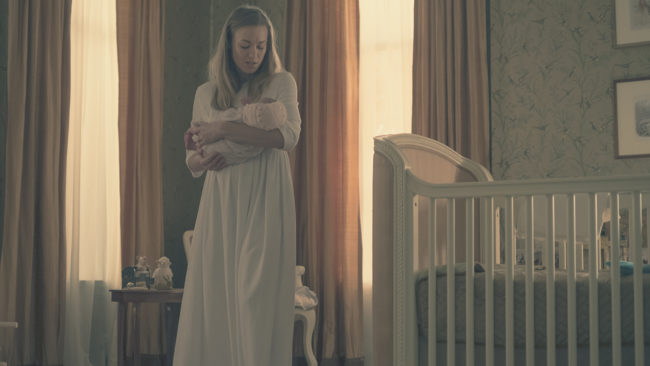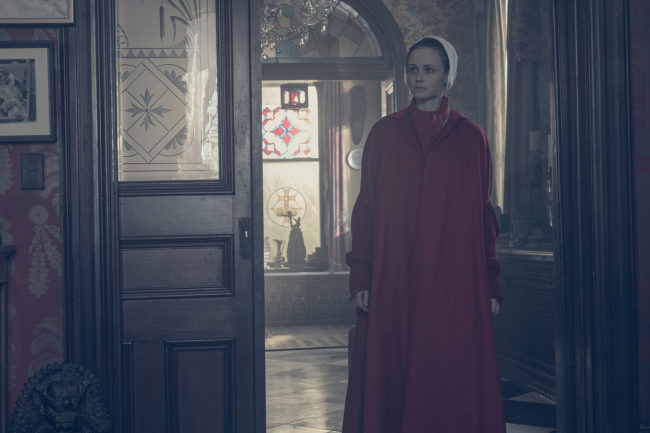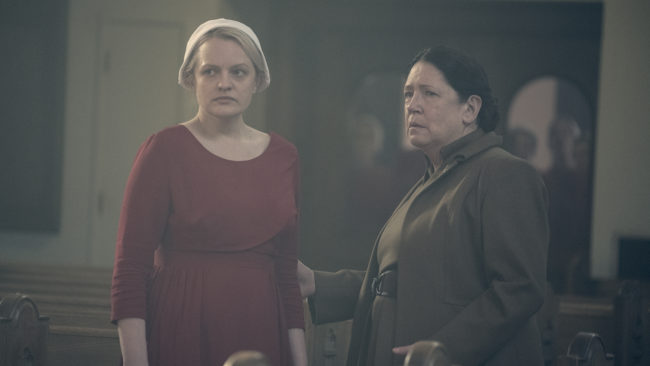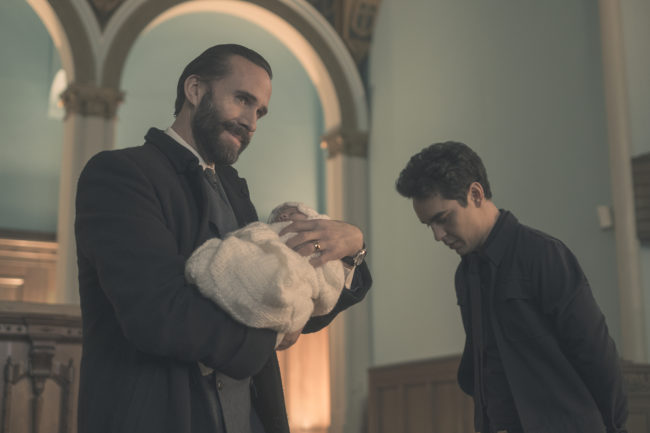The Handmaid’s Tale – S2E12 – Postpartum
Posted on July 5, 2018 by Jasmin George in Featured, The Handmaid’s Tale – S2 // 0 Comments
Previously on The Handmaid’s Tale, “Holly”
By the end of “Holly” we all knew June was regrettably destined to reprise to her role as handmaid of Gilead. If Serena were to stand by her word, which seemed indisputable, June would be off to her next posting, doomed to relive the nightmare for as many pregnancies as her body would allow. So, to see June return to the Waterford household, yet again, was fatiguing. It seemed as though The Handmaid’s Tale was back to spinning its narrative wheels once more, unsure of where to go with June, Serena, or Fred’s stories.
To be fair, June’s trip to see Hannah was entirely different than her great escape at the beginning of this season. The motivation fueling her return to the Waterfords’ – a lack of breast milk for Holly and Fred’s disgusting desire for June – was no egregious plot hole, either. Nevertheless, the scenario forced one to wonder just how many times this show can get away with bringing June so close to escape, only to be dragged back to the Waterfords, before it becomes stale and loses credibility. Honestly, I think they’ve met their quota.
Similarly, by the end of “Postpartum” Serena had, once again, softened her position on June. Allowing her to nurse Holly – or, Nicole, as Serena has named her – felt a lot like the moment when she asked for June’s help with editing. Or, when she defied Fred by allowing a woman, the best doctor in Gilead, to care for baby Angela. In nearly every episode this season, Serena has fluctuated from hot to cold, hard to soft in the span of an hour or less and it’s become quite grating.
What started out as an interesting examination of Serena’s position – the complicity in her own oppression and the internal struggle it created – has become what seems like evidence of The Handmaid’s Tale’s reluctance to pull the trigger on what path Serena will ultimately take. Perhaps a slower softening of her character would have been more productive; use her experience in Canada and the bond she was forming with June to slowly propel her towards doubt in the world of her own making. The events surrounding Eden in this episode would have made for a great tipping point, too.
Witnessing the cruel fate inflicted upon the young girl, one of Gilead’s most pious subjects, must surely have impacted Serena in some way. Allowing June to feed Holly must indicate Serena has concerns about how her own daughter will fare, when sent out into the world to become some unknown man’s child bride. Then again, maybe The Handmaid’s Tale has no interest in sending Serena on any paths of rebellion, large or small. I’d like to think that after “The Last Ceremony” it would be a hard sell anyways.
Despite those hiccups, everything that came between June’s return and Serena’s softening was The Handmaid’s Tale at its best. “Postpartum” struck a perfect balance between the show’s visceral horrors – this time around it was the ceremonial murder of Eden and Isaac – and its more subdued but equally painful ones – the separation of a child from their parents, amongst many others. It left us with plenty to retroactively reflect on, and laid the groundwork for what could be a very intriguing storyline. One that already poses a ton of questions, the most important being: just what the hell is Commander Lawrence’s deal?
Everything about Emily’s new commander and his home feels off; wrong in a different way than ritualized rape is wrong. His Martha seems far more relaxed than most, swearing loudly and acting defiant towards him in an almost joking manner. The décor in Lawrence’s house is jarring when compared with the other’s we’ve seen. It’s colorful and has character, and is nothing like the minimal and drab Waterfords’. The Commander isn’t big on the traditional Gilead greetings, replying with “super” after Emily offered hers. Even the way he talks about “the good old days” when referring to the punishment for women caught reading – which was the amputation of a hand, back then – there’s a hint of sarcasm.
Before we even entertain the idea he might be different, let’s remember that he is the architect for Gilead’s economy. Apparently, he’s also responsible for crafting the colonies, and he’s clearly violent towards his wife. Even without all of that, he’s still a man of power in this regime, so it goes without saying he’s scum. Still, there’s something mysterious about him. Unlike several other houses, he chose to take Emily in despite her sexual orientation and her history of disobedience towards Gilead. He offers her a beer before interrogating her, which might suggest he’s more laid back than most. Then again, it’s a strong parallel to Fred offering June a magazine, which was nothing more than an empty gesture, just another way of asserting his power.
I’m not willing to rule out the fact that this ambiguous tone might just be due to Bradley Whitford himself. He’s no stranger to playing a character who exudes eerie vibes that eventually turn into something far more sinister. I’ve no doubt he would have voted in favor of Gilead 3 times if he’d had the chance.
Perhaps the only man in Gilead worth giving the benefit of the doubt (aside from the late Omar) is Nick. For much of the series he’s been a rather flat character. Most of his motivations concerned June and he seemed to just float in her orbit, which was fitting; a clever inversion of the role women are so often forced to portray. But “Postpartum” gave him the chance to shine, and Max Minghella did not disappoint. Though we could have assumed Nick was one of the good guys, his interactions with June and Eden, in particular, emphasized how empathetic and brave he can be. It proved there was more to him than the blank stare he wears in his guise as Fred’s driver.
The conversation he had with June about their baby was devastating and touching, truly bittersweet. Theoretically, we knew Nick must be suffering, but it was made a blatant and painful reality here. The sorrow clouding his face as he lamented being unable to hold his child, the wonder and amusement in his smile as he learned that babies will try to eat sand, the love that so clearly filled his eyes as June presented the name Holly, it all finally offered some insight into the kind of man Nick is. For the first time, I found myself invested in his and June’s relationship.
Nick even made me care about Eden. The situation she found herself in was just as horrific as all of Gilead’s other, many horrors. But without Nick’s pleading and begging for her to do whatever it would take to save her life, and his promise to do the same going forward if she survived, infused the whole thing with a pathos otherwise missing. Nick was able to bridge the divide between Eden and Isaac, and our lack of emotional connection to them. In doing so, he made the poor young couple’s purpose in this season’s narrative just a little clearer.
Eden and Isaac, in this episode especially, felt like a mirror of warning for Nick and June. It’s not as though they weren’t aware of the risks they’d been taking to be around one another, but the consequences faced by Eden and Isaac surely hit close to home. I’m sure there’s plenty of guilt swimming inside both Nick and June right now, but things did not look great for the two when he walked away from her attempts to comfort him.
It’s possible Eden may have simply been a tool for The Handmaid’s Tale, one meant to show us what Gilead’s wrath looks like when inflicted upon other sects of its society. Perhaps she was meant to illustrate how even the most devout followers can be swayed. Maybe she was the necessary catalyst for Serena to take action. Their full impact on the story remains to be seen, but at least some of the narrative fog finally dispersed.
“Postpartum” had this kind of illuminating effect in a handful of areas. The most significant one being the emphasis it placed on the psychological and emotional toll at the very crux of what it means to be a handmaid. Once again, in theory we’re well aware of what June’s role in Gilead means. We knew she’d have her baby taken from her, and that she’d be condemned to live out this depressing cycle until either escape or death saved her from it. Knowing and seeing are two very different things.
It’s difficult to describe the myriad emotions that flooded inside me as I watched June lay on her washroom floor to be closer to Holly’s cries in the room below her. The way she caressed the floorboards, as if to calm her baby in the only possible way she could, evoked a deep sadness and anger. Possibly the most I’ve ever felt while watching this show. I don’t have children of my own, but I more than understand why June would take the risk to smell Holly’s clothes, to find some semblance of connection with her baby.
June’s despair over the loss of Hannah has always underlined her character. It came into sharp focus both last season when Serena teased June with a glimpse of her daughter, and this season when Fred set up their reunion in “Holly.” But there’s an added layer of fucked up when it comes to June’s separation from her newborn. At least Hannah knows who her real mother is. She’s just old enough to have memories of the world before Gilead, and those memories are paramount to staying strong. June is just Offred to Nicole, she’s nothing more than the “source” of the infant’s nourishment.
It’s hard to fathom what it must feel like to know that both of her daughters are destined to the same, or a similar, fate as her own. Loss and separation are compounded by guilt and helplessness, and I don’t know how these women aren’t just screaming out of the sheer exasperation of it all at every waking moment.
Still, despite how frustrating it was at first, June’s return to the Waterfords’ did wind up proving there are plenty of avenues left within which to explore her story. While I doubt The Handmaid’s Tale will ever refrain from depicting its more visceral horrors – and it shouldn’t – leaning into these quieter ones with June, the ones that carry such a heavy emotional weight without needing the spectacle, might just be part of the key to having those narrative wheels spin forwards with purpose.
Under His Eye
- Holly’s face when she realized there was no milk coming from Serena’s breast just about killed me. That poor baby did not want any part of that nonsense, and I was here for it.
- And speaking of repulsive Waterfords, Fred was absolutely dripping with sleaze this week. His arousal at the sight of June’s breast milk through her sweater, and the way he looked at her when they discussed Scrabble, was grounds for face scrunching and brow furrowing, with a hefty side of gagging.
- With all that said, Yvonne Strahovski and Joseph Fiennes are doing fantastic work. I haven’t hated fictional characters this much since… ever.
- Though Max Minghella had the best performance this week, Bradley Whitford was a nice surprise addition to the cast. He was positively creepy at every turn. The way he stared at Emily when she first arrived, the way he guzzled that beer after asking about her genital mutilation, it was enough to make my skin crawl.
- Basically what I’m saying is, EMMYs for everyone!
The Handmaid’s Tale S2E12 Review Score
-
Plot – 8.5/108.5/10
-
Dialogue – 9/109/10
-
Performances – 10/1010/10
"Postpartum"
Starring: Elizabeth Moss, Alexis Bledel, Ann Dowd, Max Minghella, Joseph Fiennes, Yvonne Strahovski, O-T Fagbenle, Samira Wiley, Madeline Brewer, Amanda Brugel





